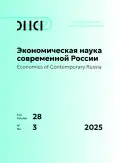Assessment of the Impact of the Russian Federation Budget System Parameters on Inflation Levels in the National Economy
- Autores: Byvshev V.A.1, Pakhomov E.V.2
-
Afiliações:
- Financial University under the Government of the Russian Federation
- Ministry of Economic Development of the Russian Federation
- Edição: Volume 28, Nº 3 (2025)
- Páginas: 5-13
- Seção: Actual problems of economics
- URL: https://bakhtiniada.ru/1609-1442/article/view/333351
- DOI: https://doi.org/10.33293/1609-1442-2025-28(3)-5-13
- EDN: https://elibrary.ru/DUUEJL
- ID: 333351
Citar
Texto integral
Resumo
The econometric assessment of the impact on inflation levels in the Russian economy of the main parameters of the budget system of the Russian Federation, which include: 1) total budget revenues, 2) total budget expenditures, 3) budget deficits, is discussed. The paper builds two econometric models in which the annual levels of inflation in the Russian economy over the time 2007-2023 are taken as an explicable variable. The explanatory variables of the model include derivatives of the main parameters of the budget system of the Russian Federation. The main results of the work are as follows. Budget deficits in the current and lag period do not affect inflation levels. Budget momentum (primary budget deficit) in the current and lag period does not affect the inflation levels. The growth rate of nominal budget revenues does not affect the levels of inflation in the current and lag period. The growth rate of nominal budget expenditures has a significant direct impact on inflation levels in Russia. The growth rate of nominal budget expenditures for servicing state and municipal debt has a significant direct impact on the inflation rate in Russia. Adverse events such as the global financial crisis and Western sanctions have a significant negative impact on the Russian economy, increasing annual inflation rates by an average of 5% per year.
Sobre autores
V. Byvshev
Financial University under the Government of the Russian Federation
Autor responsável pela correspondência
Email: vbyvshev@mail.ru
ORCID ID: 0000-0002-8234-4936
Código SPIN: 6580-7089
Dr. Sci. (Technical), Professor Moscow, Russia
E. Pakhomov
Ministry of Economic Development of the Russian Federation
Email: PakhomovEV@economy.gov.ru
ORCID ID: 0009-0005-0848-5967
Código SPIN: 5824-4046
Cand. Sci. (Economic), Deputy Director of the Department Moscow, Russia
Bibliografia
- Андреев М. (2022). Влияние бюджетного правила и модельных предпосылок на реакцию инфляции на шоки условий торговли. Серия докладов об экономических исследованиях. М.: Банк России. С. 61.
- Бакалова И. (2012). Некейнсианские эффекты фискальной политики: Россия, 1995-2011. Препринт WP12/2012/04. М.: Издательский дом Высшей школы экономики. 32 с. URL: https://wp.hse.ru/data/2012/11/16/1247831473/WP12_2012_04.pdf
- Баумоль У.Дж., Блайндер А.С. (2004). Экономикс: принципы и политика. М.: ЮНИТИ.
- Бывшев В.А. (2008). Эконометрика: учебное пособие. М.: Финансы и статистика. 480 с.
- Бывшев В.А. (2019). Моделирование финансово-экономических временных рядов в R. М.: Изд-во Финансового университета. 110 с.
- Бывшев В.А., Пахомов Е.В. (2024). Оценивание влияния бюджетного импульса и расходов бюджета на реальный ВВП России // Экономическая наука современной России. No 3 (106). С. 24-37.
- Вербик М. (2008). Путеводитель по современной эконометрике. М.: Научная книга. 615 c.
- Грин У.Г. (2016). Эконометрический анализ. Книга 1. М.: Дело при РАНХиГС. 760 с.
- Доклады Банка России (2017). "О немонетарных факторах инфляции и мерах по снижению ее волатильности". М.: Банк России.
- Долганова Ю.С., Истомина Н.А. и др. (2019). Бюджетная система Российской Федерации. Учебник. Екатеринбург: Изд-во Уральского гос. университета.
- Мясников А., Тарасов В. и др.(2023). Оценка бюджетного импульса и его неоднородное влияние на инфляционные процессы в регионах России. Серия докладов об экономических исследованиях. No 118. Октябрь. М.: Банк России.
- Пителин А.К. (2015). О немонетарных факторах инфляции // Экономика и математические методы. Т. 51. No 1. С. 45-67.
- Grauwe P.D., Polan M. (2001). Is Inflation Always and Everywhere Monetary Phenomenon? CEPR Discussion paper, no. 2841.
Arquivos suplementares








